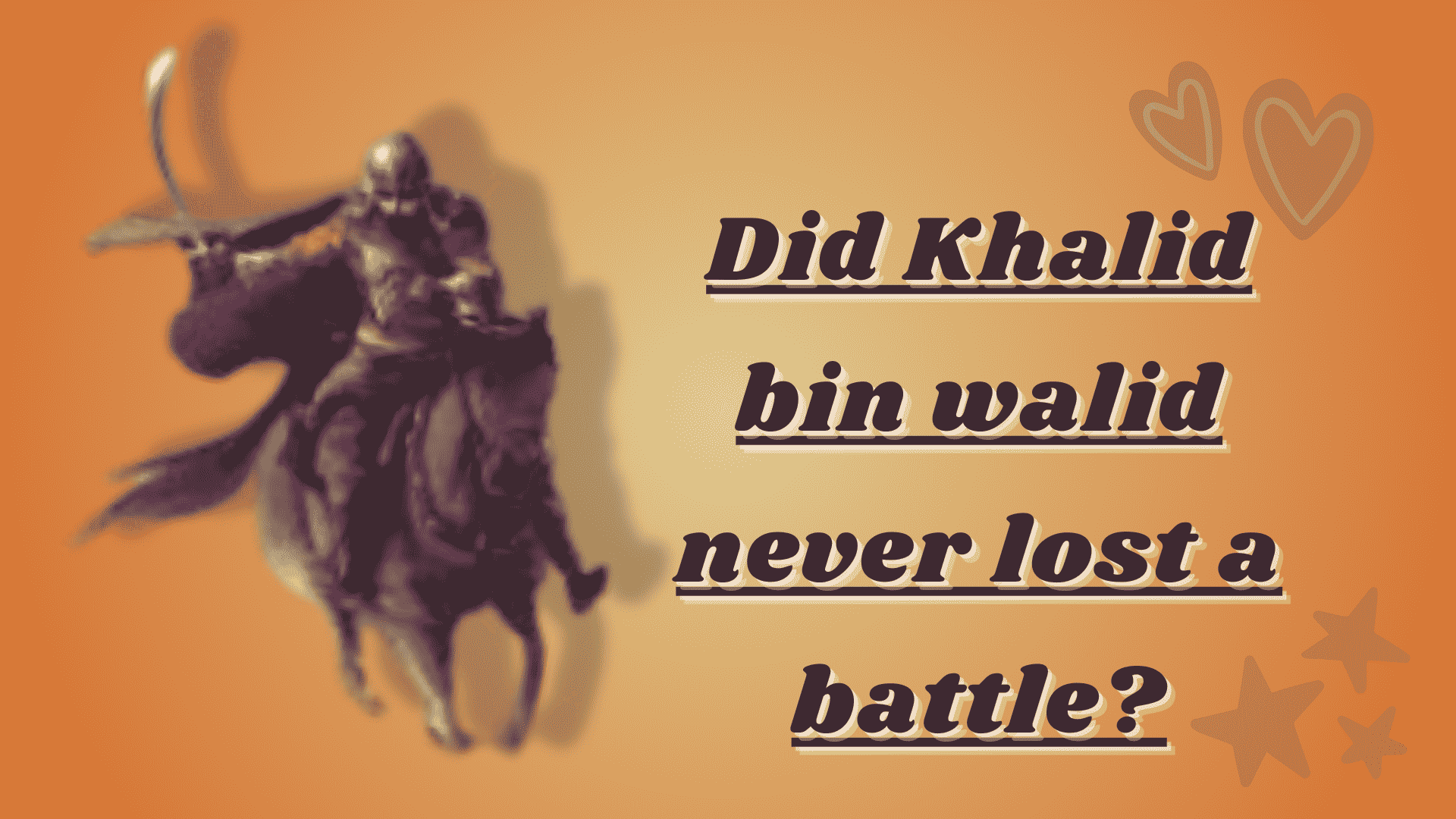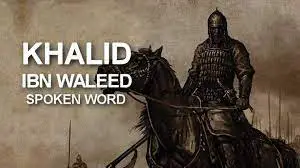Welcome to (International Stories). In this story, we will discuss the Did Khalid bin walid never lost a battle? I hope you will like the Islamic story.

Did Khalid bin walid never lost a battle?
Khalid ibn al-Walid, also known as “the Sword of Allah,” was a skilled military commander and one of the most successful generals in Islamic history. He played a significant role in the early Muslim conquests. While he achieved remarkable victories throughout his military career, it is entirely accurate to say that he never lost a battle.
There is one notable instance. During the Battle of Uhud in 625 CE, Khalid bin walid was present; however, the Muslims under the leadership of Prophet Muhammad faced defeat at the hands of the Quraysh tribe of Mecca. Khalid was involved in the battle because he had not yet embraced Islam at that time.
After his conversion to Islam, Khalid bin walid participated in numerous battles, including the Battle of Mu’tah and the Battle of Yarmouk, where he demonstrated exceptional military prowess and secured decisive victories for the Muslims. It’s essential to recognize that while Khalid was indeed a highly successful military commander, like any historical figure, he experienced both victories and setbacks throughout his career.
The life of Hazrat Khalid bin Walid
Khalid Bin Al-Waleed was a commander in the service of prophet Muhammad (peace be upon him) and the caliph’s Abu Bakr (r. 632–634) and Umar (r. 634–644) who played a leading role in the Ridda wars against rebel tribes in Arabia in 632–633 and the conquests of Sasanian Iraq in 633–634 and Byzantine Syria in 634–638.
What did Khalid bin Walid say about himself?
When the news of his death reached Madinah, there was chaos in every house. When Hazrat Khalid bin Walid was being taken down to the grave. So the people saw that his horse “Ashkar” on which he sat and fought all the battles, was also shedding tears.
Hazrat Khalid bin Walid’s inheritance consisted only of weapons, swords, daggers, and spears. In addition to these weapons, there was a slave who was always with you. This sword of Allah, which extinguished the lamp of the two great empires (Rome and Iran), had nothing at the time of his death.
Whatever he earned, he has given in the way of Allah. He spent his whole life on the battlefield. The Companions testified that in their presence we did not read any Friday in Syria and Iraq before which we had conquered a city.
That is, a city must have been conquered between the two Fridays. The great Companions of Jalil-ul-Qadr testified to the spiritual connection of Hazrat Khalid bin Walid with the Holy Prophet.
Hazrat Khalid bin Walid,s message to the Muslim Ummah:
If death is not written, then death itself protects life. When death is destined, life rushes to death. No one can live longer than life and no one can die before death.
Send my message to the cowards of the world that if death had been written in the field of jihad, death would not have come to this Khalid bin Walid on The bed.
Conclusion:
This story was written only for just Information sadqa-e-jarea and dawah work. Not our purpose to waste your precious time. Your time has more essential for us. Thanks for taking the time for reading this (Sword of God: The Life of Hazrat Khalid bin Walid(R.A) ). Good luck and have a good day.
The life of Hazrat Khalid bin Walid, a renowned military commander and companion of the Prophet Muhammad (peace be upon him), offers numerous lessons that transcend time and culture. One of the key lessons we can derive from his life is the importance of resilience, faith, and dedication in the face of challenges.
Khalid bin Walid faced many trials and tribulations throughout his life, yet he remained steadfast in his commitment to Islam and its principles. His unwavering faith served as a guiding light, enabling him to overcome obstacles and emerge victorious in battles. His strategic brilliance and military prowess were unparalleled, but it was his unyielding belief in the cause he fought for that truly set him apart.
Furthermore, Khalid bin Walid’s humility and willingness to learn from his mistakes are qualities worth emulating. Despite his numerous victories, he never allowed pride to cloud his judgment. Instead, he continuously sought to improve himself and grow both spiritually and intellectually.
Moreover, Khalid bin Walid’s story exemplifies the transformative power of repentance and forgiveness. Despite his early opposition to Islam, he embraced the faith wholeheartedly and dedicated the rest of his life to serving Allah and His Messenger. His remarkable transformation serves as a reminder that it is never too late to seek redemption and strive for righteousness.
In conclusion, the life of Hazrat Khalid bin Walid teaches us the importance of resilience, faith, humility, and repentance. His example serves as an inspiration for believers across generations, reminding us to remain steadfast in our convictions, strive for excellence in all endeavors, and always seek forgiveness and guidance from the Almighty. By embodying these virtues, we can navigate life’s challenges with grace and emerge stronger in our faith and character.
FAQ:
What does Quran say about Khalid bin Walid?
The expedition of Khalid ibn al-Walid, to Najran, took place in 10AH of the Islamic Calendar, Around June 631 AD. The event is mentioned partly in the Quran verse 3:61. The event is also mentioned by the Muslim jurist Tabari, who mentions that Muhammad wrote a letter to Khalid ibn al-Walid.
Who is known as the Lion of Allah?
After the Battle of the Trench, when Ali defeated Amr ibn Abd al-Wud, Muhammad reportedly gave Ali the name Asadullah (Lion of God) and praised him, saying ‘Ali’s strike on Amr ibn Abd al-Wud is greater than the worship of both mankind and jinn until the Day of Judgement.

What was the biggest battle of Khalid Ibn Walid?
Battle of Yarmouk, also called the Battle of Yarmuk, (20 August 636). After the devastating blow to the Sassanid Persians at Firaz, the Muslim Arab forces, under the command of Khalid ibn al-Walid, took on the army of the Christian Byzantine Empire at Yarmouk near the border of modern-day Syria and Jordan.
Who is the best Khalifa in Islam?
Uthman reigned for twelve years as a caliph. During the first half of his reign, he was the most popular caliph among all the Rashiduns, while in the latter half of his reign, he met increasing opposition, led by the Egyptians and concentrated around Ali, who would albeit briefly, succeed Uthman as caliph.
What was hazrat khalid bin walid death date?
Hazrat Khalid bin Walid, also known as Khalid ibn al-Walid, passed away on 21st of February, 642 AD (21st of Muharram, 21 AH in the Islamic calendar).
What was hazrat khalid bin walid date of birth?
Hazrat Khalid ibn al-Walid, also known as Khalid bin Walid, was born in the year 592 CE (approximately). His exact date of birth is not widely recorded in historical sources, but it is commonly believed to be in this year based on estimates from historical events and timelines.
What were hazrat khalid bin walid quotes?
What was hazrat khalid bin walid family tree?
Hazrat Khalid ibn al-Walid, also known as Khalid bin Walid, was a renowned military commander and one of the companions of the Prophet Muhammad (peace be upon him). His family tree is as follows:
Khalid ibn al-Walid ibn Mughira ibn Abdallah ibn Umar ibn Makhzum ibn Yaqazah ibn Murrah ibn Ka’b ibn Lu’ayy ibn Ghalib ibn Fihr ibn Malik ibn al-Nazr ibn Kinana ibn Khuzaymah ibn Mudrikah ibn Ilyas ibn Mudar ibn Nizar ibn Ma’ad ibn Adnan.
This lineage traces back to Adnan, a descendant of the Prophet Ismail (peace be upon him), who in turn was the son of the Prophet Ibrahim (Abraham, peace be upon him). Hazrat Khalid ibn al-Walid belonged to the Banu Makhzum clan of the Quraysh tribe in Mecca.


Good and amazing history ❤
Your point of view caught my eye and was very interesting. Thanks. I have a question for you.
Your article helped me a lot, is there any more related content? Thanks!